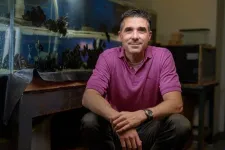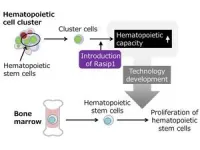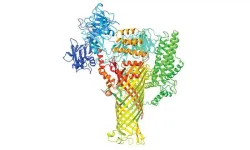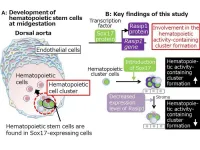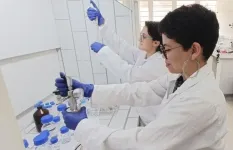(Press-News.org) WEST LAFAYETTE, Ind. – Glue holds the world together. Without adhesives, much of modern human civilization — including our cellphones, cars, furniture, walls and the packages arriving on our doorstep — would simply fall apart.
The trouble with all those adhesives is that they are not sustainable. A team of chemists at Purdue University led by Jonathan Wilker, professor of chemistry in the College of Science and of materials engineering, aims to change that with a new, completely sustainable adhesive system. The team’s findings were released in a paper in Nature.
Additional Information
Shellfish inspire chemists to develop new, stronger, more sustainable glues
Environmentally sustainable commercial adhesive from Purdue is optioned to gluECO Adhesives
Changing seawater hints at future for adhesives from sea creatures
“Our current adhesives create all sorts of environmental problems,” Wilker said. “Almost all glues are petroleum-based and do not degrade. The bonded materials in our products stay stuck together. Consequently, we cannot recycle many of the materials that we put into our recycling bins. Discarded products will sit in landfills for centuries and, sometimes, contribute to ocean microplastics.”
Wilker and his lab have spent years studying the science of sticky substances, analyzing marine animals that adhere, like mussels and oysters, and trying to create better, sustainable, affordable adhesives that work as well as any glue from the hardware store. He has a drawer of those commercial glues in his lab, which give off a strong and familiar smell.
“Those volatile petrochemicals in these glues can be toxic, which is a further problem with current technologies,” Wilker said. One example is the common building material plywood, which is formed of wood pieces held together with formaldehyde-based adhesives. Newly built houses are off-gassing formaldehyde, exposing residents to this carcinogen.
These substances are harmful both to the environment and to human health. However, people and companies are accustomed to using traditional adhesives; they’re strong, easy to produce and relatively inexpensive. Any new adhesive must work at least as well as traditional products, which is why Wilker keeps that drawer around: to test them, side by side, against innovative substances.
“By studying how nature makes adhesives, we are learning how to design new technologies for our future society,” Wilker said. “Given all of the problems generated by current glues, we feel an obligation to create something better. Ideally, new adhesives will be bio-based and nontoxic. Strengths should be as high as current products. Then we would like to bond them strongly when needed and also be able to take the substrates apart when wanted. Further design constraints that we grapple with, in order to have impact, are costs needing to be low and having all starting compounds available at large scales.”
After a series of experiments on a range of different biologically sourced and sustainable ingredients, the team settled on epoxidized soy oil for a main component. Epoxidized soy oil is already produced globally on a massive scale. For their work, the smallest container that they could purchase was a 55-gallon drum of the substance. Since each experiment uses just a little epoxidized soy oil, the level in their drum has dropped only a few inches after several years of testing.
Wilker and his team added the epoxidized soy oil to malic acid, a compound most known for giving apples their tart flavor. Then they added tannic acid, to provide an aspect of the chemistry that mussels use for attaching themselves to rocks and each other. Tannic acid is a component of tannins, common in trees, red wine and black tea. Those three ingredients added up to an adhesive that is inexpensive, effective, scalable, practical to produce and completely sustainable.
“If you combine these components under the right conditions, adhesives can be made that are as strong as epoxies,” Wilker said. Epoxies are generally considered to be the highest performance class of adhesives. “All of the components are bio-based, safe and already available at train car scales. A bonus is that the adhesive is easy to make. Basically, you can mix and heat the components.” Other bio-based compounds can also be used with epoxidized soy oil, generating an entire family of new sustainable adhesives.
To test the adhesive’s performance, the scientists bonded together objects — wood, plastics or metals — and then used an instrument for breaking the bonds and measuring forces. In many cases, their new adhesives held up well, sometimes performing similarly to, or even better than, traditional toxic adhesives such as a superglue and an epoxy. Further research will refine the system and work to maximize societal and environmental impacts in areas ranging from medical innovations to industrial materials to packaging. Their team’s innovations may pave the way to a more sustainable system for holding the world together.
Wilker disclosed his adhesives to the Purdue Innovates Office of Technology Commercialization, which has applied for a patent to protect the intellectual property. This research was supported by the Office of Naval Research.
About Purdue University
Purdue University is a public research institution with excellence at scale. Ranked among the top 10 public universities and with two colleges in the top 4 in the United States, Purdue discovers and disseminates knowledge with a quality and at a scale second to none. More than 105,000 students study at Purdue across modalities and locations, with 50,000 in person on the West Lafayette campus. Committed to affordability and accessibility, Purdue’s main campus has frozen tuition 12 years in a row. See how Purdue never stops in the persistent pursuit of the next giant leap, including its first comprehensive urban campus in Indianapolis, the new Mitchell E. Daniels, Jr. School of Business, and Purdue Computes, at https://www.purdue.edu/president/strategic-initiatives.
END
Solving stickiness sustainably
Chemists uses nature as inspiration for a sustainable, affordable adhesive system
2023-09-13
ELSE PRESS RELEASES FROM THIS DATE:
Mysterious family of microbial proteins hijack crops’ cellular plumbing
2023-09-13
DURHAM, N.C. -- Many of the bacteria that ravage crops and threaten our food supply use a common strategy to cause disease: they inject a cocktail of harmful proteins directly into the plant’s cells.
For 25 years, biologist Sheng-Yang He and his senior research associate Kinya Nomura have been puzzling over this set of molecules that plant pathogens use to cause diseases in hundreds of crops worldwide ranging from rice to apple trees.
Now, thanks to a team effort between three collaborating research groups, they may finally have an answer to how these molecules make plants sick -- and a way to disarm them.
The findings appear Sept. 13 in the journal Nature.
Researchers ...
World-first AI foundation model for eye care to supercharge global efforts to prevent blindness
2023-09-13
Researchers at Moorfields Eye Hospital and UCL Institute of Ophthalmology have developed an artificial intelligence (AI) system that has the potential to not only identify sight-threatening eye diseases but also predict general health, including heart attacks, stroke, and Parkinson’s disease.
RETFound, one of the first AI foundation models in healthcare, and the first in ophthalmology, was developed using millions of eye scans from the NHS. The research team are making the system open-source: freely available to use by any institution worldwide, to act as a cornerstone for global efforts to detect and treat blindness using AI. ...
Researchers identify lesser-known factors associated with firearm violence
2023-09-13
Key takeaways
Social determinants of at-risk neighborhoods: Higher proportions of poverty and low per-capita income were most associated with higher rates of shooting incidents.
High levels of social stressors: The study found that fatal and non-fatal firearm assaults were clustered in neighborhoods with high levels of social stressors measured with the 2018 version of the Centers for Disease Control and Prevention’s (CDC) Social Vulnerability Index (SVI).
A potential tool for directing anti-violence initiatives: The CDC’s SVI can help policymakers target neighborhoods at ...
The origins of blood: Researchers identify a gene critical to blood production
2023-09-13
Researchers from Tokyo Medical and Dental University (TMDU) have discovered that a gene called Rasip1 is intimately involved in the creation of blood cells
Tokyo, Japan – Blood has long been a symbol of life and health, so it may be surprising that some aspects of blood production, i.e., hematopoiesis, remain incompletely understood. One such mystery is the role of a protein called SOX17. Blood cells are generated by hematopoietic stem cells (HSCs), and SOX17 seems to be important to the development of HSCs because SOX17 is expressed where HSCs first develop. What exactly SOX17 does, however, has remained unclear.
Now, a research team at Tokyo Medical and Dental University (TMDU) ...
Ohio’s droughts are worse than often recognized, study finds
2023-09-13
COLUMBUS, Ohio – A new type of analysis suggests that droughts in Ohio were more severe from 2000 to 2019 than standard measurements have suggested.
Researchers at The Ohio State University developed impacts-based thresholds for drought in Ohio, looking specifically at how corn yield and streamflow were affected by various drought indicators, such as notable changes in soil moisture, crops, and even livestock losses in the state.
The results suggest this impacts-based approach could give Ohio farmers earlier and more accurate notice when drought conditions are approaching, said Steven Quiring, co-author of the study and a professor ...
Building the first-ever digital twin of the bladder
2023-09-13
Men ages 50 to 60 have an 80 percent chance of having some degree of bladder outlet obstruction (BOO) due to an enlarged prostate – which causes multiple symptoms that can impact their lives physically and psychologically.
The bladder, an incredibly complex organ, has its own electrical system and can change its constituents and geometry through a growth and remodeling process. However, in bladders with BOO, the urethral resistance increases and forces the muscle cells within the bladder to generate larger pressures to void. Over time, the bladder adapts with a growth and remodeling response that causes changes in bladder size, tissue composition, ...
B-GOOD invites participants to its closing conference in Slovenia this October
2023-09-13
The EU Horizon 2020 project B-GOOD, aiming at improving honey bee health and beekeeping sustainability, invites participants to the project’s closing conference in Bled, Slovenia this October. The upcoming scientific event will feature oral presentations, poster sessions, and information market stands to provide a comprehensive overview of the results and technologies developed during the project. The attendees will also be able to meet the consortium members of the project, ask questions and exchange ideas.
The event will take place on the 2nd of October 2023 immediately before the COLOSS ...
UTSA study: More Texas owls are testing positive for rat poisons
2023-09-13
New research suggests that owls in Texas have high rates of anticoagulant rodenticides (AR)—blood thinning rat poisons—in their systems. Jennifer Smith, a professor of integrative biology in the UTSA College of Sciences, co-authored a research article published recently in PLOS ONE, the world’s first multidisciplinary open access journal.
Eres Gomez, M.S. ’22, a UTSA graduate who had conducted research in the Smith Wildlife Lab as a student, was the article’s lead author. Heather Prestridge, a curator ...
A novel method to obtain acetone more simply, safely and cheaply
2023-09-13
Acetone is an essential chemical industry input and is used in the manufacturing of a wide array of products, such as adhesives, antibiotics, electronic components, solvents and removers, inks and vitamins, among others. Its production is complex and hazardous. To simplify the process and make it safer and cheaper, researchers in Brazil and Germany have developed an innovative method that uses only light and photoactive iron chloride (FeCl3), an inexpensive chemical compound.
An article on the research, which was funded by FAPESP, is published in the ...
Life in boiling water
2023-09-13
Oak Ridge National Laboratory scientists studied hot springs on different continents and found similarities in how some microbes adapted despite their geographic diversity. The findings yield clues to the evolution of life and whether some of the hardiest microbes may be harnessed for biotechnology.
The study was the first of its kind to sample hot springs on three continents with water temperatures above 65 C (149 F) in the United States, Iceland and Japan. The environments have unique geology and chemistry, almost like a fingerprint, so it was surprising to find highly related microbes separated by thousands of miles, said ORNL’s Mircea Podar, co-lead of the ...
LAST 30 PRESS RELEASES:
The unprecedented transformation in energy: The Third Energy Revolution toward carbon neutrality
Building on the far side: AI analysis suggests sturdier foundation for future lunar bases
Far-field superresolution imaging via k-space superoscillation
10 Years, 70% shift: Wastewater upgrades quietly transform river microbiomes
Why does chronic back pain make everyday sounds feel harsher? Brain imaging study points to a treatable cause
Video messaging effectiveness depends on quality of streaming experience, research shows
Introducing the “bloom” cycle, or why plants are not stupid
The Lancet Oncology: Breast cancer remains the most common cancer among women worldwide, with annual cases expected to reach over 3.5 million by 2050
Improve education and transitional support for autistic people to prevent death by suicide, say experts
GLP-1 drugs like Ozempic could cut risk of major heart complications after heart attack, study finds
Study finds Earth may have twice as many vertebrate species as previously thought
NYU Langone orthopedic surgeons present latest clinical findings and research at AAOS 2026
New journal highlights how artificial intelligence can help solve global environmental crises
Study identifies three diverging global AI pathways shaping the future of technology and governance
Machine learning advances non targeted detection of environmental pollutants
ACP advises all adults 75 or older get a protein subunit RSV vaccine
New study finds earliest evidence of big land predators hunting plant-eaters
Newer groundwater associated with higher risk of Parkinson’s disease
New study identifies growth hormone receptor as possible target to improve lung cancer treatment
Routine helps children adjust to school, but harsh parenting may undo benefits
IEEE honors Pitt’s Fang Peng with medal in power engineering
SwRI and the NPSS Consortium release new version of NPSS® software with improved functionality
Study identifies molecular cause of taste loss after COVID
Accounting for soil saturation enhances atmospheric river flood warnings
The research that got sick veterans treatment
Study finds that on-demand wage access boosts savings and financial engagement for low-wage workers
Antarctica has lost 10 times the size of Greater Los Angeles in ice over 30 years
Scared of spiders? The real horror story is a world without them
New study moves nanomedicine one step closer to better and safer drug delivery
Illinois team tests the costs, benefits of agrivoltaics across the Midwest
[Press-News.org] Solving stickiness sustainablyChemists uses nature as inspiration for a sustainable, affordable adhesive system
